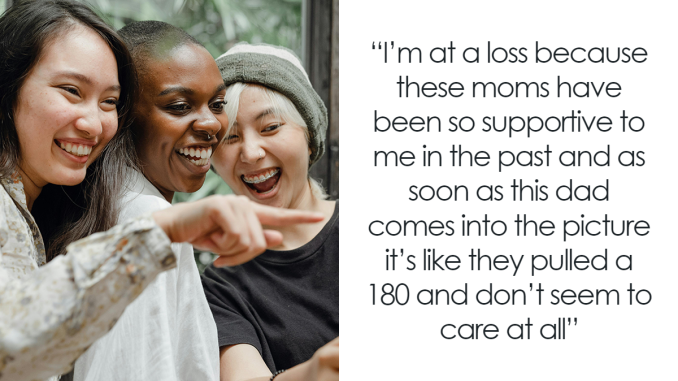
Having kids who go to school or daycare usually means having to socialize with other parents. Whether it’s about school matters or organizing playdates, keeping a good relationship is important. Not only does it make drop-off and pick-up easier, but it helps your child make friends more easily, too. When they’re at this age, parents decide who they will socialize with.
But even parent friend groups aren’t immune to sexism. In this story, a single mother protested a widower dad joining their mom group chat. She claimed she didn’t feel comfortable with a stranger having her contact information. Yet other mothers called her behavior out as sexist and hypocritical. What do you think, Pandas?
Parents often create group chats to communicate about school and daycare-related things
Image credits: Ketut Subiyanto/Pexels (not the actual photo)
But this mother wanted to keep the chat strictly men-free for some reason
Image credits: Cottonbro Studio/Pexels (not the actual photo)
Image credits: Tatiana Syrikova/Pexels (not the actual photo)
Image credits: notcomfyaita
Single dads still face discrimination in society
However ironic that may be, dads experience gender bias in parent groups. For many families, it’s still the mom’s duty to arrange playdates, drop kids off, and pick them up from school. Naturally, the moms form parent groups where they arrange for their kids to socialize and keep each other informed about daycare and school-related things. So, if a single dad comes into the picture, they should accept him in the group, too, right?
Deakin University actually did some research on this, and they found mom groups should be more inclusive to dads. “Sadly, based on what the participants told us, the fathers who did express an interest in parents groups quickly realised it was a female-dominated space and stopped attending,” Lead Researcher Norma Barrett said.
This story is a great example of how some moms don’t want dads in their mom groups. And this situation is not a one-off thing. Author and single parent Talon Windwalker shared his experience of how he would face sexism from other parents often.
“People are absolutely stunned when they discover that I adopted Tigger as a single parent,” he writes. “‘But where is the mother?’ There is no mother. ‘Did she die? Are you divorced?’ They can’t comprehend it.”
The school staff would often assume that Windwalker wouldn’t put much effort into helping out with events. Then the teachers would act surprised when he would come in with a batch of homemade pumpkin harvest cookies.
Even less pleasant assumptions used to be about his son’s hygiene. When the boy would go to school in ripped jeans and a stained hoodie, the teachers assumed that the father was neglectful. In reality, the father and son would discuss this, and he would let the child know he looked dirty.
Another dad, who’s the primary carer for his children, Charlie Pinker, describes how out-of-place he felt in the world of “mom groups.” “Generally, anything directed towards parents seems to still be overwhelmingly directed specifically towards the mums.”
And while he agrees that it makes sense, he couldn’t help but feel left out. “I guess I wanted to be acknowledged; to see that dads were recognised as being fully capable self-sufficient parents as well as mums,” he wrote.
Mommy cliques can be toxic to mothers as well as to fathers
Generally, parent groups are important for parents as they provide much-needed support. “The transition to parenthood can be an anxious time for both mothers and fathers. The arrival of a first child affects multiple facets of parents’ lives including their physical, mental and social health,” Dr. Barret explained when talking about her research.
“Previous research shows first-time parents groups are beneficial to both mums and dads. As well as providing parenting information, they nurture family connection, provide peer support and [offer] a sense of community connectedness.”
However, sometimes, mom groups can also turn into pretty toxic cliques. Some parents describe socializing with fellow parents as being back in middle school. The awkwardness, the dirty side looks, the excluding one parent from lunch plans – it’s like reverting to being in third grade.
Family Psychotherapist Dr. Fran Walfish Calgary’s Child Magazine says that while it may be hard to believe that adult people behave this way, it does happen. First, she advises people to look inward. Maybe it’s not a “them” problem. Maybe it’s a “you” problem. “Really ask yourself if there’s anything about you that might be a turnoff and try to work on yourself first before you point a finger outward,” she said.
It’s up to the new addition to the parent group to show they’re willing to do the work. That’s why Walfish recommends showing initiative: volunteering for a daycare/school event, for example. If that doesn’t work, try looking for a partner in crime within the group. It’s natural to not click with some people, so a parent shouldn’t strive to be everybody’s friend. Finding that one warm, responsive parent in the group might be the key to fitting in.
Lastly, while parent groups are beneficial and handy, it’s okay not to be a part of one. Having to deal with drama aside, it can also show a great example to your child about being independent and having strong friendships instead of seeking popularity. Not every parent is part of a clique, so don’t be afraid to not be one of the sectarians. It might even work out for the better in the end.
People in the comments called the woman out for her hypocrisy
The post “That’s A ‘You’ Problem”: People Slam Mom For Trying To Ban Single Dad From Parents’ Group Chat first appeared on Bored Panda.
